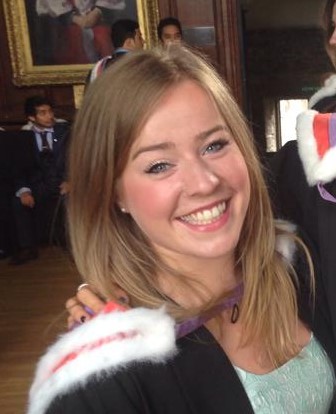Hannah Bedding Profile

What year did you graduate?
2014
What subjects did you study prior to arriving in Durham?
A levels: Geography, History, Sociology.
AS level: Theatre Studies.
Which degree programme did you study at Durham and why?
Geography (BSc).
I find the relationship between the physical and human world fascinating and wanted to delve a bit deeper and study this relationship in more detail at university to understand how particular social structures and cultures had developed over time as a result of the physical and natural environment. Geography was always my favourite subject at school and I loved getting out into the field and seeing the processes that you learned about in the classroom put into context at an awe inspiring level. The broad range of skills that Geography equips you with was also appealing and came into use when applying for jobs after I graduated.
What were the highlights of studying at Durham?
The highlights of studying Geography at Durham was the range of fieldtrips on offer within the BSc course. I was lucky enough to go to Nepal in my third year and carry out an independent research project on the perceptions of earthquakes and the corresponding susceptibility of houses in rural Nepal. The expertise in the department is second to none and it is exciting being taught by academics at the top of their field who are enthusiastic about their subject.
What was the topic of your third-year dissertation?
Despite being on the BSc course, I was keen to incorporate the human side of Geography into my dissertation to further understand the relationship between the physical and social world. My dissertation was therefore centred around the perceptions on risk and was entitled: Perceptions of Risk: The case of an actively eroding coastline along the Ventnor Undercliff, Isle of Wight.
What are you doing now and how did your degree help prepare you?
I work for a town planning consultancy called Barton Willmore in their environmental planning team. This involves project managing Environmental Impact Assessments on major developments which are considered to have likely significant impacts on the environment. I am also involved in preparing reports for particular developments such as socio-economic assessments, health impact assessments and strategic environmental assessments. The report writing and research skills you gain as part of the Geography course have been invaluable during my time at Baron Willmore as I have to review as well as prepare reports for a range of different development projects including residential, mixed use, commercial, industrial and energy schemes. I also find that I am able to utilise both the physical and human strands of Geography which is something I was keen to understand throughout my degree.
What other skills did studying at Durham help prepare you for the world of work and your future career?
Whilst small, Durham is an extremely social university with ample opportunity to get involved in societies and extra-curricular events both inside and outside of your department. The collegiate system at Durham really helps add to the social buzz and you get to meet many different people both within your college but also within your department and societies. This ability to meet and get on with people from different backgrounds and experiences has equipped me with the people skills to enable me to work across and with large project teams. A large part of my role at Barton Willmore is managing sub-consultancy teams and you have to ensure you adopt the most appropriate skills to ensure the team delivers on time. Working in teams on academic projects, as well as engaging with people on an extra-circular level, set me up for this particular aspect of my current role.
With hindsight, what else would you have liked us to have taught you?
I felt the careers service at Durham could have been better and perhaps tailored to specific departmental jobs rather than being a generic service for all students. When I left Durham, I was not aware of how to conduct myself in an interview or an assessment centre and I found these were skills taught (or at least offered) at other universities. Rather than solely focusing on the academic services, I think the department and the university would benefit from giving students the opportunity to engage in sessions which discuss interview and job hunting techniques.


/prod01/prodbucket01/media/durham-university/departments-/geography/Matt_Couchmann-3872X1296.JPG)